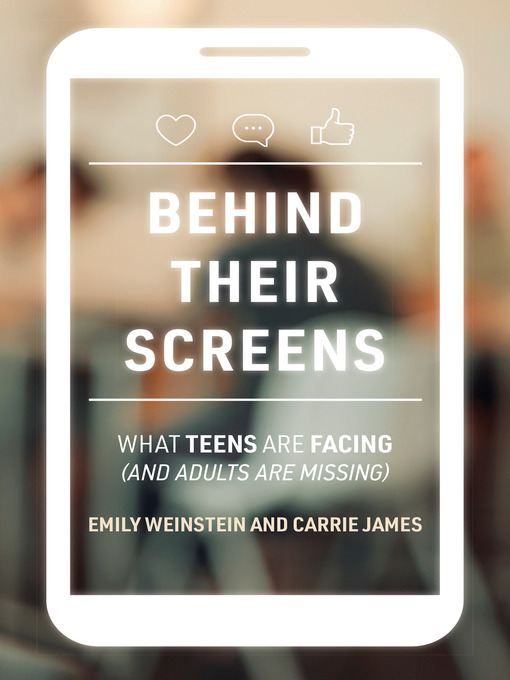Behind Their Screens
What Teens Are Facing (and Adults Are Missing)
“A new and important voice to the conversation around teenagers and the ways we interact with our screens.” —San Francisco Chronicle
What are teens actually doing on their smartphones? Contrary to many adults’ assumptions, they are not simply “addicted” to their screens, oblivious to the afterlife of what they post, or missing out on personal connection. They are just trying to navigate a networked world. In Behind Their Screens, Emily Weinstein and Carrie James, Harvard researchers who are experts on teens and technology, explore the complexities that teens face in their digital lives, and suggest that many adult efforts to help—“Get off your phone!” “Just don’t sext!”—fall short.
Weinstein and James warn against a single-minded focus by adults on “screen time.” Teens worry about dependence on their devices, but disconnecting means being out of the loop socially, with absence perceived as rudeness or even a failure to be there for a struggling friend. Drawing on a multiyear project that surveyed more than 3,500 teens, the authors explain that young people need empathy, not exasperated eye-rolling. Adults should understand the complicated nature of teens’ online life rather than issue commands, and they should normalize—let teens know that their challenges are shared by others—without minimizing or dismissing. Along the way, Weinstein and James describe different kinds of sexting and explain such phenomena as watermarking nudes, comparison quicksand, digital pacifiers, and collecting receipts. Behind Their Screens offers essential reading for any adult who cares about supporting teens in an online world.
-
Creators
-
Publisher
-
Release date
August 16, 2022 -
Formats
-
Kindle Book
-
OverDrive Read
- ISBN: 9780262371421
-
EPUB ebook
- ISBN: 9780262371421
- File size: 512 KB
-
-
Languages
- English
-
Reviews
-
Publisher's Weekly
June 6, 2022
Weinstein and James (Disconnected), researchers who have spent a decade studying teens’ digital lives at Harvard’s Project Zero, reveal the gaps between adults’ assumptions and what teens are actually up to in this fascinating deep dive into online behavior. The reality of “growing up digital,” they argue, is vastly different from the alarmist headlines; while there are apps “designed to hijack focus,” for instance, it’s a “mistake” to view being glued to one’s screen “as evidence that teens don’t care about connection.” Group chats, meanwhile, haven’t eroded “the age-old qualities that make or break friendships,” and sexting can be “consensual and wanted by both parties” or “pressured or even actively coerced,” which is important for parents to grasp so the issue is met with more understanding than just the reflexive instruction to not do it. The authors round things out with a call for “digital agency,” which can be established by “creating space for young people to explore true tensions and dilemmas” in classrooms and at home. The authors’ research is impressive, and the “Teens Want Adults to Know” sections at the end of each chapter add some nice perspective. Parents and educators losing sleep over what’s happening online would do well to give this a look. -
Kirkus
June 1, 2022
A disturbing look at the turbulent world of social media and its impact on adolescents. Weinstein and James, researchers at Project Zero at Harvard, structure their book around surveys and interviews that get at the heart of a simple yet fraught question: "What worries you most about today's digital world?" The responses varied so much that the authors often found it difficult to reach any definitive answers, but the process revealed numerous surprises. A predictable but significant finding was that many teens are concerned that they spend too much time on social media, distracting them from the real world. Many are not getting enough sleep because they are constantly worried that they might miss something. However, they also believe that disconnecting is not an option. "For many teens, technologies are a non-negotiable for friendship preservation," write the authors. "There's no way to opt out without major social repercussions. They wish adults would acknowledge this reality." There is also a sense of constantly being under scrutiny. One wrong text, post, or action can result in ostracism or worse. For example, one boy who rejected the romantic advances of a girl found himself accused of being a rapist on social media. Some teens refuse to reveal their political views because of the possible consequences, and the result is an echo chamber of enforced consensus. In fact, one of the most vicious debates that Weinstein and James encountered was whether it was acceptable to even consider the views of people who disagree with you. It all sounds like a labyrinth of constant pressure, image comparison, and virtue signaling. In the concluding chapter, the authors offer advice for parents, emphasizing the need to avoid simplistic solutions, to understand the complexity of the social media environment, and to listen with empathy. For anyone who wants to know where the social media road is leading, this is an important, worrisome book.COPYRIGHT(2022) Kirkus Reviews, ALL RIGHTS RESERVED.
-
Formats
- Kindle Book
- OverDrive Read
- EPUB ebook
subjects
Languages
- English
Loading
Why is availability limited?
×Availability can change throughout the month based on the library's budget. You can still place a hold on the title, and your hold will be automatically filled as soon as the title is available again.
The Kindle Book format for this title is not supported on:
×Read-along ebook
×The OverDrive Read format of this ebook has professional narration that plays while you read in your browser. Learn more here.


